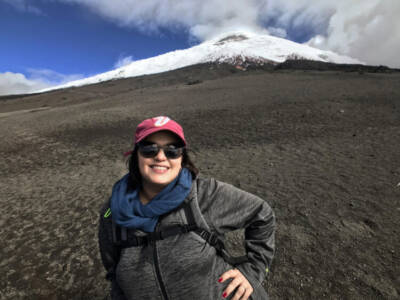For the last few years in October – pre-COVID-19 – Northwest Vista College’s Natural and Physical Sciences department sponsored Sci-Tober. Students took part in science demonstrations on patios and met with advisors and faculty over two days. One of the show stoppers was opening crystal-filled geodes or rocks. Students were amazed and it made for good pictures.

With the popularity of these experiments, NVC’s Geology instructor, Dulce Cruz and the NVC Earth Science faculty, helped to start the Earth Science Lab for non-science majors – a lab accompaniment for an introductory level course. The lab provides hands-on experience that enhances the level of student understanding gained in a lecture-only class.
But the coronavirus forced Dulce to figure out a new way to give students that “hands-on” approach. She has learned to bring it to life instead of showing them just photos and videos.
Through the use of a setup, similar to a Ziggi camera, Dulce is able to provide high-definition clarity to help students with interaction. For example, she’s able to show students on Zoom an extreme close-up (with a live explanation) of minerals and other specimens along with a demonstration of testing methodologies that they would be using in the lab.
“It helps provide students a level of interactivity (in other words, prevent ‘Zoom shyness’),” she says.
And while the lab has moved from the patio to Zoom, students are still signing up.
“Our Earth Science enrollment numbers have maintained steady, even during these pandemic times. Adapting to times of need is something that I have learned from being a foreign-born instructor,” said Dulce, who received the Outstanding Adjunct Faculty Award from the National Association of GeoScience Teachers in its two-year college division last fall.
The lab helps students with their problem-solving and critical thinking skills. Students learn practical experience through exercises in various Earth Science topics, such as minerals and earth materials, topography and landform identification, geological mapping, plate tectonics, geologic history, the atmosphere, oceanography, and the similarities vs. differences of Earth to other planets in the solar system.
“We take that opportunity to share with them the idea that our Earth Science lab is an applied, and often visual, extension of the Earth Science lecture that can help them see its connection to their communities and lives. In the end, like any of our NVC’s science labs, the key goal is that our labs help empower students to scientific knowledge and skills to make informed decisions as citizens,” Dulce added.

3 Comments
Dr. Nick DeLillo
Abdiel Santiakob
Cindy Magruder